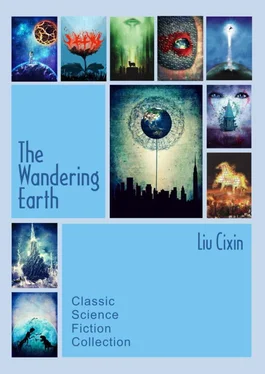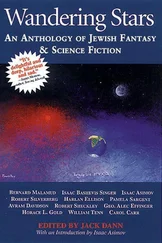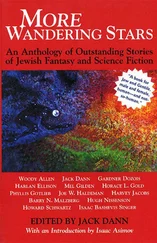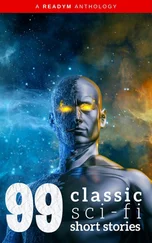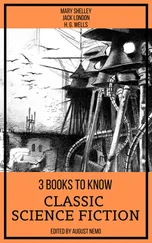The day of departure had finally arrived!
When we deplaned, we were immediately blinded by the brilliant jets of the Earth Engines. Their plasma plumes were several magnitudes stronger than when we had last seen them. Even through closed eyes we could see that the beams had been righted and were now shooting straight toward the sky. The Earth Engines were running at full power.
The acceleration gave rise to 300-foot rolling, thunderous waves that assaulted every continent. Scorching hurricanes howled through the boiling froth, screaming through the countless towering beams of plasma with unbridled fury, uprooting almost every tree on Earth. Our planet had also become a gigantic comet, its blue tail piercing the dark of space.
Earth was on its way, and with it, all of humanity.
Just as we began our journey, my grandfather passed away, his burnt body ravaged by infection.
In his final moments, he repeated over and over, “Oh, Earth, my wandering Earth…”
CHAPTER 2
The Exodial Age
After we de-boarded, our school prepared to relocate us to a subterranean city; we would be among the first group of inhabitants. Our descent began when our school bus entered a massive tunnel which soon became a smaller corridor deep below, always sloping downward. After traveling for about half an hour, we were told that we had entered the city; but as I looked out of the bus’ window as we drove on, I could only ask myself, ‘What city?’
All I could see was an endless parade of labyrinthine, branching cave passages and countless sealed, metal doors. A row of floodlights hung from the cave’s high ceiling, bathing everything in a dull, metallic blue. I could not help but feel disheartened at the realization that, for most of the remainder of my life, this would be my world.
“Early humans lived in caves and so will we,” Ling said quietly, but not quietly enough for Ms. Xing not to hear.
Turning to us all, she intoned, “There is nothing we can do about it, children. The surface will soon become a very, very terrible place. It will be so bad, that your spit won’t even make it to the ground. When the cold comes, it will freeze in mid-fall and when it is hot, it will evaporate even as it leaves your mouth!”
Our teacher had barely finished her admonishment when a younger child turned to me and asked, “The cold part I understand; it’s ’cause the Earth will move further and further away from the Sun, but why will it get hot?”
“Idiot, didn’t you learn about orbital acceleration?” I snapped back.
“No,” he responded, shirking.
It was Ling who took it upon herself to patiently explain the situation to the child, almost as if she wanted to dispel her erstwhile melancholy. “Things are different than you think. It’s like this: The Earth Engines are not that powerful. They can only accelerate the Earth a bit and certainly not enough to launch the Earth out of its solar orbit in one fell swoop. In fact, the Earth will circle the Sun fifteen orbits before it can escape! During these fifteen orbits, the Earth will slowly pick up speed. Right now, the Earth’s orbital path is still pretty much circular, but as the Earth accelerates, its orbit will become increasingly elliptical. The faster it moves, the flatter the ellipse will become, and the more the Sun will be shifted toward one end of the orbit. When the Earth is at its farthest point away from the Sun, it will naturally be very cold.”
“Right, but it still doesn’t make sense! When the Earth is furthest from the Sun, it will be very cold and when it is at the other end of the ellipse, its distance from the Sun will… hmm, let me think.” He thought for a moment. “No, the orbital dynamics states that we’ll not get closer than we are now… So why should it get hotter?”
The child truly was a little genius. It was a real blessing that genetic memory engineering had brought such a child the memories of his father, making him the norm. Without them, even in 400 years we could not have realized the god-eclipsing miracle such as the Earth Engines.
Even so, I gave a snarky answer. “But there are still the Earth Engines, you dolt. Right now, more than ten-thousand of those giant blow-torches are being switched to full power. The Earth itself is basically just the ring that holds those rocket nozzles.” I shook my head in mock disgust. “Now just be quiet. You’re annoying me!”
Thus we began our life underground. The subterranean cities spread across the continents. They were built one-third of a mile below the surface and each one had enough space for over a million inhabitants. Under the Earth’s surface, I finished primary school and entered middle school.
Most of my schooling concentrated on the physical sciences and engineering; the arts and philosophical subjects, on the other hand, were condensed to a bare minimum. The human race had no time for such distractions now. All in all, humanity was then probably the busiest it had ever been. The work never ceased and there was always more to do. Interestingly enough, the religions of the surface world vanished without a trace overnight. We still had history lessons, but our history books portrayed humanity’s history under the Sun as life in a mythical paradise.
My father was an astronaut serving in the space fleet’s Low Earth Orbit Wing. He was on the job almost constantly and I rarely saw him at home. I remember that in the fifth year of the Earth’s acceleration, our entire family visited the seaside as the planet reached its aphelion. For us Aphelion Day was a holiday much like New Year or Christmas. At the furthest point from the Sun, we could indulge in a false sense of security.
We still needed to wear thermal suits to go to the surface. To keep us warm, these suits were fully sealed and powered by nuclear batteries. Once outside, the blinding light of Earth Engines’ plasma jets was almost all that we could see. The brilliant glow of this forest of energy beams seemed to swallow the entire world. We had to travel for many hours in our flying car before we managed to escape their glow and we were actually able to see the sunlit seashore. The Sun itself had become tiny, no larger than a baseball. It hung in the sky, utterly unmoving, its distant rays only illuminating that one area with dawn-like light. Around us, the sky was the deepest blue we had ever seen and in it the stars were clearly visible. Looking into the distance, I for a moment wondered where the ocean had gone. Now before my eyes there was only a vast white, icy plain stretching to the horizon.
A large group of revelers had gathered on the frozen ocean, shooting fireworks into the dark blue sky. The mood of the celebration was truly extraordinary. All around I could see drunken party-goers rolling on the ice as my ears were assaulted by songs being belted out. It seemed that no one could agree on which song would be appropriate, leading to a cacophony of voices, all trying to outdo each other at the top of their lungs.
“Despite it all, they all want to live their own life and there’s nothing wrong with that,” my father said. He paused, suddenly remembering something he had not yet shared. “Oh, I forgot to tell you all; I’ve fallen in love with Li Xing. I want to move out to live with her.”
“Who is she?” my mother asked tranquilly.
“My primary school teacher,” I answered in my father’s stead. Having started middle school two years ago, I had no idea how my father had come to know Ms. Xing. Maybe he had met her at my graduation.
“Well, then go,” my mother said.
My father continued his thought. “I’m sure to tire of it after a while. I’ll come back then. Does that sound all right?”
“If you want to, certainly,” my mother answered, calm as the frozen ocean all around. But then, a few moments later, her emotions were at last stirred. “Ah, look at how beautiful that one is!” she shouted, pointing at an exploding firework in the sky, genuinely moved by its spectacular display. “I bet it had a holo-projecter inside!”
Читать дальше
